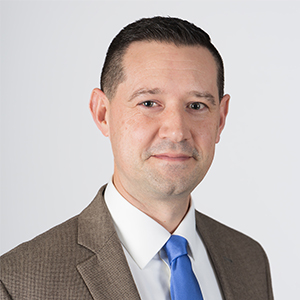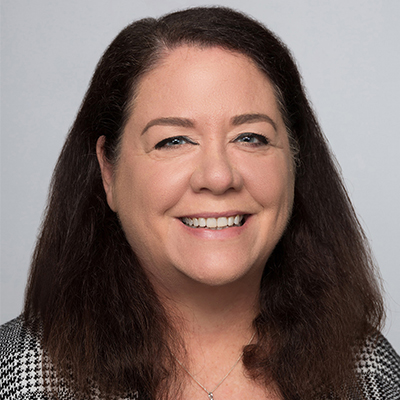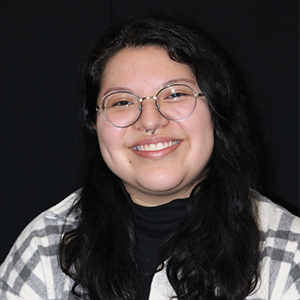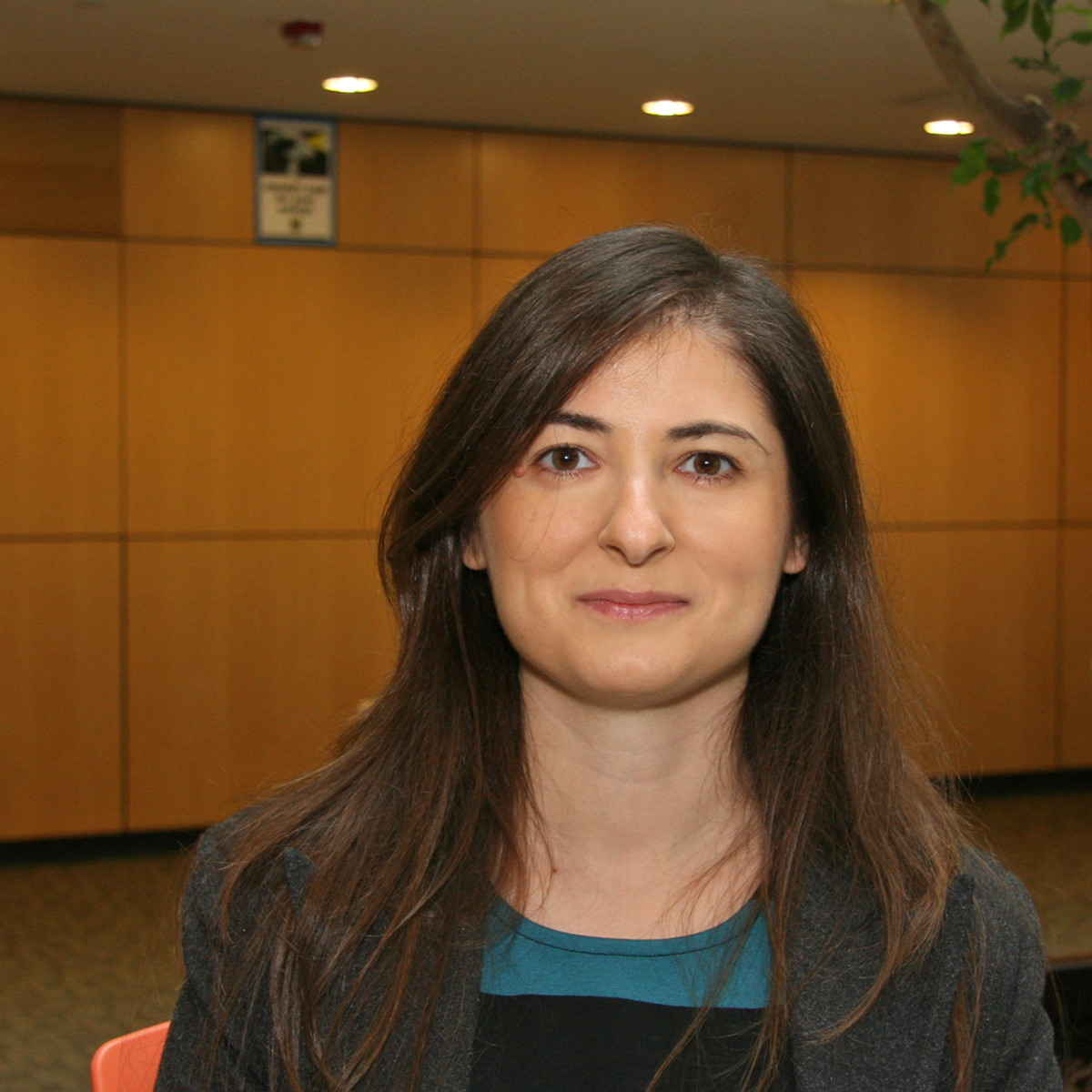Committee Member Q&A
Kerrin Wolf
Associate Professor of Law
What is your position at Stockton, and how did you become interested in the CCDIE?
I am an associate professor of Business Administration and Public Law and currently serve as the chair of that program. I became involved
in CCDIE because Dr. (Zornitsa) Kalibatseva asked if I would be interested in serving
on the committee. I was aware of some of the initiatives CCDIE has contributed to
over the past few years, and it seemed like an effort that I wanted to be a part of.
As a new CCDIE member, what do you hope to contribute to the CCDIE and diversity and
inclusion at Stockton?
Since this is my first year on the CCDIE, I am just beginning to understand all of
the work that CCDIE does. I am most interested in contributing to curriculum efforts
that focus on diversity and inclusion, particularly in areas where diversity and education efforts are underexplored.
What do you hope the CCDIE will explore over the next few years?
This is a precarious time for diversity and inclusion initiatives. I believe the CCDIE should focus on maintaining its involvement
on campus and keeping diversity and inclusion as priorities on campus.
What advice would you share with students in our campus community who want to get
involved in diversity, equity, inclusion and social justice at Stockton?
All of us still have a lot to learn about each other. So, be open-minded about all
opportunities that are presented to you, particularly if they may expose you to different
experiences, cultures and communities. If we can model this behavior, we can then
help lead our communities to embrace the ideals of diversity, equity,and inclusion.
Laurie Dutton
What is your position at Stockton, and how did you become interested in the CCDIE?
As the inaugural director of the Women’s, Gender and Sexuality Center (WGSC), my role
is to advocate for equity, support and empowerment for women and LGBTQ+ individuals
within our campus community. My journey with the Committee on Campus Diversity and
Inclusive Excellence (CCDIE) began years ago with a deep commitment to fostering a
more inclusive campus environment. Over the years, I have worked closely with diverse
student groups, faculty and staff, witnessing firsthand the positive impact a welcoming
and inclusive community can have on individuals' lives.
I became interested in CCDIE because its mission aligns closely with the values that
we’ve upheld at the WGSC for the 10 years we have been on campus. CCDIE provides a
platform to address and bridge gaps in equity and inclusion, which are central to
the work we do every day. As a returning member, I am honored to continue contributing
to the committee’s work, helping to ensure that Stockton remains a place where every
person feels like they matter.
As a returning CCDIE member, what do you hope to contribute to the CCDIE and diversity
and inclusion at Stockton?
I hope to bring a continued focus on gender equity and LGBTQ+ inclusion to our discussions
and initiatives. We need it now more than ever. My goal is to ensure that our policies
and programs remain intact to support the intersecting identities of all community
members, acknowledging how factors like gender, sexual orientation, race and socioeconomic
background impact access and experiences on campus.
One of my key contributions will be fostering initiatives that promote awareness,
education and allyship across our university. I also aim to share insights from my
work at the WGSC, including successful programs and emerging needs identified through
direct engagement with students. By amplifying these voices and lived experiences,
I hope to contribute to creating an environment where every student feels empowered
and included, with equal access to opportunities for growth and success at Stockton.
What do you hope the CCDIE will explore over the next few years?
Over the next few years, I hope the CCDIE will explore initiatives that build from
the strong foundation laid for inclusion and representation. A major part of this
vision is the renaming of the Women’s, Gender, and Sexuality Center. Renaming the
center would be a powerful step in recognizing our community’s history and commitment
to justice while creating a lasting symbol of inclusion and resilience on campus.
Additionally, I hope CCDIE will focus on finding pathways to promote authentic self-expression
for all students, especially in South Jersey’s often polarized landscape. We have
an incredible opportunity to bridge divides and foster understanding across different
perspectives by promoting dialogue, empathy and respect. I am hopeful that by focusing
on shared values and human connections, we can create common ground, making Stockton
a place where all students feel safe to be themselves, learn from one another and
thrive.
What advice would you share with students in our campus community who want to get
involved in diversity, equity, inclusion and social justice at Stockton?
Do it! Do not delay! No one can sit on the sidelines any longer. We need all the help
we can get to be successful and move forward.
Is there anything else you believe is important for our readership to know?
I believe it’s essential for our readership to know that Stockton’s commitment to
diversity, equity and inclusion is not only about policy or programs—it’s about people.
Every initiative we take on at the CCDIE and the WGSC aims to create an environment
where each member of our campus feels seen, valued and supported.
We are in a time when voices, particularly those of marginalized communities, need
to be heard and uplifted more than ever. This work involves everyone, from students
to faculty to administrators, coming together to foster an inclusive and compassionate
culture. I invite everyone in our community to join us in this mission, to engage
in conversations (brave spaces), to learn from one another, and to stand in community
with each other in shaping a more equitable future at Stockton. It may seem like an
uphill battle, but your support, involvement and commitment can make all the difference
for the future.
Andrea Sandoval
How did you become interested in the CCDIE?
I decided to join the CCDIE because I wanted to voice my experiences as a first-generation
Latina student from a low-income household so that I could advocate for those who
come from similar backgrounds. I also wanted to work alongside other members of the
committee who come from diverse backgrounds and hear their perspectives on how to
create a more inclusive and diverse community.
What do you see as your main contribution to the CCDIE’s work this year?
My main contribution to the CCDIE’s work this year was being able to bring other students’
perspectives and experiences, including my own, into the conversations that were discussed
at meetings. Committee members are able to understand what current and prospective
students need in order for a student to thrive and feel welcomed at Stockton.
You have many roles on campus – can you describe these roles and why students need
to get involved?
One of my biggest roles on campus is being the president of Stockton’s Student Senate.
The Student Senate serves as the governing body and the voice of the student population:
the organization is the bridge between students and administrators. The Senate also
allocates funds to the various clubs and organizations on campus and promotes school
spirit.
Some of my other roles on campus include treasurer for Los Latinos Unidos, the biggest
Latino organization on campus, and for Stockton University’s Environmental Club, which
advocates for the environment while also having fun.
I work at the Office of Community Engagement and Service Learning as a member of the
Engagement Leadership Team. The office's mission is to develop relationships with
community partners so that students may increase their engagement within the local
community. Another part of the mission is helping students understand social justice
issues and participate in civic engagement so that they may learn and increase their
participation in social change.
Additionally, I am a resident assistant (RA) in Kesselman Hall, where many of my residents
are first-year and/or EOF students. As an RA, I can help students transition to college
while creating and promoting programs that will help them succeed. Not only that,
but I am a figure who they can turn to regarding any concerns or questions they may
have as residential students at Stockton University.
I believe that it is important for students to get involved because it allows them
to find their sense of belonging and community here. You are able to create meaningful
relationships with other students, staff and faculty while also growing as an individual,
personally and professionally. It also allows you to create change on campus, such
as creating a space for students who may need it or have similar interests/experiences
as you. Being involved is definitely part of the Stockton University experience.
What advice would you share with other members of the campus community who want to
get involved in diversity, equity, inclusion and social justice at Stockton?
My advice would be to keep an open mind, always be willing to learn, and understand
that you may be wrong at some point. It is also important to understand that diversity,
equity, inclusion and social justice are more than just race. They also include gender,
sexuality, religion, disability, socioeconomic status and age. There will be uncomfortable
conversations; however, you will be able to understand more about the different backgrounds
that exist at Stockton.
What do you hope that the CCDIE will explore over the next couple of years?
I hope that the CCDIE will explore more about intersectionality since it is an important
topic to discuss, especially in our current society. I also hope that the CCDIE will
speak more with the student population about what kind of resources they need or other
resources they would like to see in the future. While being a student representative
allows me to share the voices of the student population, I cannot always best represent
every group and their perspectives.
Zornitsa (Zori) Kalibatseva
Associate Professor of Psychology
What is your position at Stockton, and how did you become interested in the CCDIE?
I am an associate professor of psychology at Stockton. Some of the classes I teach
include "Cross-Cultural Psychology," "Psychology of Race" and "Racism and Culture
and Mental Health." My research focuses on racial and ethnic disparities in mental
health and providing culturally sensitive psychotherapy. In 2016, Dr. Sonia Gonsalves
nominated me to join the campus climate subcommittee because of my background in assessment
and my commitment to diversity, equity and inclusion. I became faculty co-chair of
the CCDIE in the fall of 2023.
What do you see as your main contribution(s) to the CCDIE’s work over the years?
My main contributions to the CCDIE have been related to the campus climate survey.
In 2016-2017, I worked alongside Dr. Donnetrice Allison and Dr. Brian Tyrrell to develop
the survey, collect and analyze the data, and prepare the report. Later, I worked
with my colleagues on the subcommittee to edit the existing survey and prepare it
for the 2023 launch. I was also involved in exploring an employee affinity group for
international faculty/staff.
What do you hope that the CCDIE will explore over the next few years?
I hope the CCDIE will continue to identify ways (e.g., events, trainings, Celebrate
Diversity) in which make our campus and community an inclusive place where we can
engage in a dialogue and develop understanding and compassion. In particular, I hope
we can have everyone, from students to faculty and from staff to administrators, develop
self-awareness, engage in meaningful conversations about race and racism, and take
action to address racial disparities through social justice and education.
What words of wisdom would you share with other members of the campus community who
want to get involved in diversity, equity, inclusion and social justice at Stockton?
Diversity, equity and inclusion are an integral part of the work we do in higher education;
it is not an add-on. We need all hands on deck to work toward social justice for all.
It can also be challenging and frustrating when you meet resistance or people deny
your humanity. Talking to people who have been doing this work and finding support
is paramount to keep doing the work.
Previous Highlights
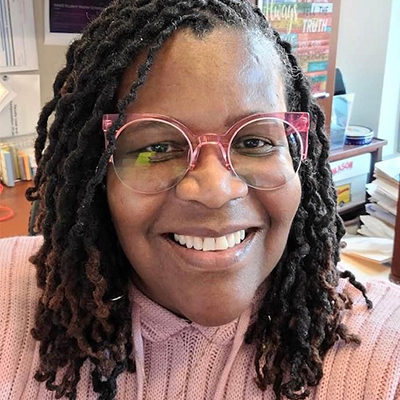
What is your position at Stockton, and how did you become interested in the CCDIE?
I am the executive assistant to the Dean of Natural Sciences and Mathematics. I initially
became aware of the CCDIE through NAMS’ former assistant dean, who was a member. As
a Black woman in America, diversity and inclusion is always top of mind, so my interest
in the CCDIE was very natural. My interest in participation also relates to the fact
that I graduated from Stockton State College. I care about Stockton’s success.
As a returning CCDIE member, what do you hope to contribute to the CCDIE and to diversity
and inclusion at Stockton?
At the very least, my hope is to encourage support for mandatory training for the
university’s faculty, staff and students. It is difficult, and unrealistic, to expect
people to evolve when many, most likely, don’t even know what true inclusion looks
like. Microaggressions, implicit bias, microinvalidations, (the list goes on) cause
serious harm. Sometimes the offender isn’t even aware they’re subjecting others to
these unpleasant, avoidable experiences. But the injury to the person on the receiving
end is often deep and long-lasting. I can still remember situations from 3rd and 4th
grade and how they made me feel.
What do you hope that the CCDIE will explore over the next few years?
Over the next few years, I would like the CCDIE to explore mechanisms to move Stockton
toward genuine diversity and inclusion. I want to see the hard work of this committee
put into practice and translated into honest, permanent change. I attended the President’s
Bi-Annual Address to Staff. I feel invigorated by the presence of President Joe and
Dr. Sass. I feel their warmth and their sincerity. The Ethic of Care – dignity, kindness,
respect, compassion and civility – is an amazing way to lead an institution. I look
optimistically forward to what is to come under their leadership.
What advice would you share with students in our campus community who want to get
involved in diversity, equity, inclusion and social justice at Stockton?
My advice to any young person who wants to get involved in diversity, equity, inclusion
and social justice at Stockton and elsewhere is to pace yourself. It’s a long, hard
road. It is taxing. It takes an emotional toll. It is important to know when to step
back and regroup. It is important to know that the resistance is real and it runs
deep. This country has a very unpleasant past that many would like to return to while
simultaneously sweeping it under the rug. It is important to have a safe space to
retreat to when you’re feeling overwhelmed. I’m very happy that Stockton now has the
Multicultural Center. I pray it lives up to its purpose.
For those students interested in involvement who are not people of color, I encourage
you to actively seek education. Do the hard work involved in learning to be a true
ally. That word is thrown around much too casually. Many want to claim the title without
truly fulfilling the role, often resulting in danger for those you claim to support
and protect.
Is there anything else you believe is important for our readership to know?
I would like EVERYONE to understand that change does not occur, in any situation,
without a sincere commitment to engage. It’s easy to sit on the sidelines, nod your
head and agree. It’s quite another to participate. We all have a role to play in bringing
Stockton’s culture around to safety and real inclusivity for all who cross our threshold.
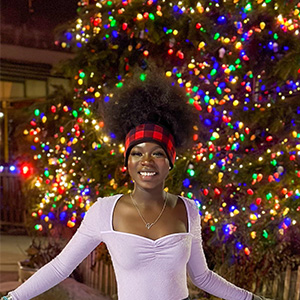
How did you become interested in the CCDIE?
I heard about this committee through Stockton University’s Student Senate. At the
time I was a member of the Diversity and Inclusion committee for the Student Senate,
and my committee was asked if a member was interested in joining this committee. I
volunteered to be a part of this because I was already dedicated to bringing and ensuring
diversity and inclusion on the student level. This would be a great opportunity that
would allow me to work with other members of the Stockton community (who are not just
students) on something that I was already passionate about.
What do you see as your main contribution to the CCDIE’s work this year?
I have been able to bring my perspective as a student and as someone very involved
on campus to this committee. We discuss issues and topics that impact the community
as a whole but most importantly students. And my perspective as a student is extremely
beneficial to these discussions.
You have many roles on campus – can you describe these roles and why students need
to get involved?
As mentioned before, I am the Chairperson of the D&I committee for Stockton’s Student
Senate, the liaison between students and Stockton professionals. The Senate exists
to represent the students and their issues and concerns. I am also a student worker
for the Dean of Students office.
In addition, I am currently a member of and on the student advisory board as Vice-Chair
of TogetHER, which is a retention initiative that seeks to provide women of color
with the tools and help they need to be successful during their years at Stockton,
and currently the secretary for the African Student Organization, which provides a
space for our African students on campus. Being involved in all these organizations
and being a student worker has helped me create amazing connections, strengthened
my skills as a worker and a student and exposed me to all of Stockton's community.
I encourage other students to get involved because this is our campus: the student
organizations, staff and faculty members are all here to help and provide a welcoming
space for us during our time at Stockton. So, take advantage of them because they
will truly change your University experience.
What advice would you share with other members of the campus community who want to
get involved in diversity, equity, inclusion and social justice here at Stockton?
I would encourage every student to get involved in diversity, equity, inclusion and
social justice on campus. In my three years of being at Stockton, I realized that
this university is committed to making sure this campus is as diverse and inclusive
as it can be. And it makes me happy and proud to be a part of the Stockton campus
and a part of the individuals working so hard to ensure that this continues.
What do you hope that the CCDIE will explore over the next couple of years?
I hope that this committee continues the amazing work that they have been doing and
I hope that we get more student involvement along the way.
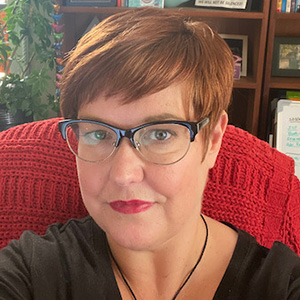
What is your position at Stockton and how did you become interested in the CCDIE?
I am assistant professor of Social Work primarily assigned to the MSW program. I was
interested in the Committee because I had done diversity related work at another university
that included a campus climate survey. I wanted to work with other faculty members
and staff who were serious about moving the needle on inclusion not just talking about
it.
What do you see as your main contribution(s) to the CCDIE’s work over the years?
I’ve spent the past two years working on the campus climate survey that is getting
ready for distribution this semester. That involved reviewing the findings and recommendations
of the previous survey and modifying the instrument to capture current pertinent issues.
You are a member of the Subcommittee on Campus Climate. Please tell us briefly about
the Employee Campus Climate Survey that will be distributed this spring semester to
employees.
The idea with the campus climate survey is to hear from all employees at Stockton
about how they perceive the climate for working at Stockton. That encompasses many
things such as experiences of discrimination and harassment to how one is made to
feel welcome or valued on a day-to-day basis on campus or in a particular office,
academic program, etc. The findings and recommendations can then be shared with the
administration and used to lobby the administration for changes to increase meaningful
inclusion of particularly the most marginalized groups on campus.
As you continue your participation on the CCDIE, what do you hope the CCDIE will explore
over the next couple of years?
While on its surface, flexible work schedules may not feel related to campus climate,
diversity and inclusion. However, the reality is that it very much does matter for
those things to be realized. So, while it might not seem an intuitive initiative for
us to take up, I think we are going to need to be a voice or help elevate the voices
of people who work here and need to be seen as more than bodies filling a chair or
a classroom.
What words of wisdom would you share with other members of the campus community who
want to get involved in diversity, equity, inclusion and social justice at Stockton?
I would say explore what options exist at Stockton that you can join or start your
own if you see yourself not represented. This also might relate to the question above,
as there is the idea of both supporting existing resources along with supporting people
to create new resources/programs, etc., on campus that may not exist yet.
Is there anything else that you believe is important for our readership to know?
As a researcher, I would really appreciate if people took the campus climate survey
so that we have as much data as possible to try to make genuine changes or improvements
on campus.
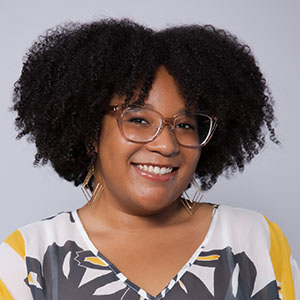
What is your position at Stockton and how did you become interested in the CCDIE?
I recently joined the University Relations and Marketing (URM) team here at Stockton
University. My position is fairly new in the department. As a Multicultural Communications
Specialist, I write articles and social media content that highlight underserved student
populations.
I became interested in the CCDIE during my internship at URM, when I was brought into
committee meetings and learned more about our newsletter, Celebrate Diversity. During
that time, I got to meet the committee and Communications & Branding subcommittee.
I was also given the chance to write about the committee’s 2022 Unity Day celebration
as one of my first website articles. After pitching and writing an article about the
Unified Black Students Society’s annual Black Gala for Celebrate Diversity, I was
hooked and ready to do more!
As a new CCDIE member, what do you hope to contribute to the CCDIE and to diversity
and inclusion at Stockton?
I hope to continue the work that I have been doing with the committee since I was
an intern: writing about diverse student experiences. Students deserve to feel like
the institution that they are either calling their four-year home or alma mater accurately
cares for and represents them. Even though I’m not a programmer or decision-maker,
I am someone who can, at the very least, try to connect students with the roles that
do in order to support them and their experience here through writing about their
experiences.
What do you hope the CCDIE will explore over the next few years?
From what I saw on Celebrate Diversity, the CCDIE explores many different populations
of students already, including older adult learners, those who are pregnant or caregiving,
and more. I hope to see this continue to expand through more articles and programming
that are more student-centered and driven, including alumni and graduate students.
Writing and formally documenting these experiences are just some of the other ways
to contribute to the mosaic of diversity here at Stockton.
What advice would you share with students in our campus community who want to get
involved in diversity, equity, inclusion and social justice at Stockton?
I would say to just make that passion known to all whom you encounter. There are so
many staff and faculty members here dedicated to making Stockton a diverse, equitable
and social justice-centered institution. There are also many student leaders on campus
who believe in the same mission and have a vision for Stockton. The problem is that
we’re not seeing each other! We’re all on the same team—now we just have to start
playing the game in unison rather than apart.
Is there anything else you believe is important for our readership to know?
It’s easy to talk about Stockton whether positive or negative like it’s some sort
of entity that doles out classes and grades. However, Stockton isn’t just an entity.
Behind every office, department and student organization, there are hard-working people,
working toward building a community. Take the time to get to know someone outside
of your usual circle—you’ll be surprised at how much you both have in common.
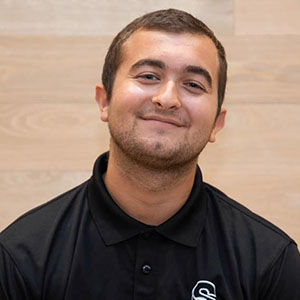
How did you become interested in the CCDIE?
I learned about CCDIE during my first year in the Student Senate. The Senate was asked
which students would be interested in serving on a committee whose goal and mission
was to increase inclusion amongst students, faculty and staff. I leaped at the offer
to serve alongside dedicated, like-minded individuals to try and increase diversity
and inclusion on campus.
What do you see as your main contribution(s) to the CCDIE’s work for the past two
years?
I have had the opportunity to serve on the Social Justice & Education Subcommittee,
where we worked on the Unity Day Conference. This subcommittee worked exceptionally hard batting against the unknown variables
that COVID-19 brought with it. As a student, I was able to bring in student interest
and involvement by coordinating a student panel for the conference. Through this,
community members and faculty at Stockton were able to learn that faith is still prominent
amongst the younger generation.
As a student senator, please share with us how the Student Senate Standing Committee
on Diversity & Inclusion might collaborate on diversity, inclusion and social justice?
The Student Senate D&I committee is always open to discussing any issues revolving
around social justice. Each member acts as a liaison between the Senate and at least
one student organization serving a marginalized identity. This committee has started
an annual event titled “Continue the Movement” to raise concerns about the struggles
the African American and Black communities face in America.
You’ll be graduating soon and will be an alum. If you were nominated to return to
the CCDIE as an alum, would you accept a nomination? Why?
100% yes! While being a student, I can aid in giving a student perspective on issues;
however, an alum can provide an outside perspective. Having different perspectives
is how conversations and change can happen because of different experiences. I hope
that if nominated, I can bring to the committee new ideas that could aid in the mission
to increase inclusion on the campus I have called home for the past five years.
What do you hope the CCDIE will explore over the next few years?
I hope that CCDIE explores other identities and helps connect students with faculty
and staff members who share these identities. Recently, the committee started an international
faculty affinity network. My role as the student representative was attempting to
connect students with these faculty members to promote mentorship and scholarship
opportunities. As a first-generation student, mentorship is a value of mine, and I
hope to aid in other first-generation students’ journeys.
What advice would you share with students in our campus community who want to get
involved in diversity, equity, inclusion and social justice at Stockton?
Never hesitate to ask around and vocalize your interests and opinions. Start with
joining a club or organization that has a similar identity to you and then work with
them to spread your opinion. Bringing up these issues may seem daunting at first but
gathering support and having educational conversations are the first steps to seeing
change happen.
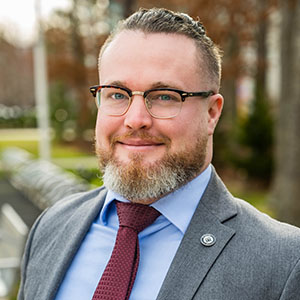
What is your position at Stockton and how did you become interested in the CCDIE?
Since my first day at the University on Jan. 18, I have been impressed and inspired
by the energy that students across campus demonstrate with their spirit, activism
and involvement. I knew I wanted to get involved beyond the scope of my position/office
and thought that CCDIE was the perfect blend of my passion and professional experience.
At every institution where I have previously worked, I have continuously sought ways
to further the important work of promoting and ensuring equity, inclusion, representation
and education for all students. Before any other important work in academia can be
accomplished, the foundation of equity, inclusion and opportunity must be laid. CCDIE’s
work is the bedrock of the institution socially, spiritually, academically and morally.
I am incredibly excited to lend my enthusiasm for this work to this integral process.
As a new CCDIE member, what do you hope to contribute to the CCDIE and to diversity
and inclusion at Stockton?
Since embarking on my professional career as a member of the adolescent unit with
the New Jersey Department of Children and Families working for DCP&P (formerly DYFS)
over a decade ago, I have consistently been involved in equity and inclusion initiatives
in various capacities. A few of my favorite roles were serving as a Diversity Advocate
on search committees at George Mason University, serving as a Diversity Task Force
member at Bucknell University and most recently being appointed by students as the
advisor to the Black Student Union at Georgian Court University. I believe my unique
life experiences, coupled with my varied professional roles in multiple states on
the East Coast, make me uniquely equipped to serve on this committee. I consistently
seek to challenge antiquated ideologies and engage in difficult conversations by “calling
people in,” as opposed to “calling them out.” My professional training as a mediator and social worker will serve me well in
a role where cultural competence, empathy, patience and grace are so important.
What do you hope the CCDIE will explore in the next two years?
I’m excited about the direction that institutions of higher education across the country
are headed regarding restorative justice practices in the conduct arena. The old model
of punitive action or a one-size-fits-all approach to adjudicating student issues
is becoming a thing of the past in favor of more empathetic, flexible and meaningful
restorative practices focused on promoting learning and healing whenever a code of
conduct incident occurs. My hope is the important work the CCDIE team continues to
do will coincide and strengthen the direction in which my office is already moving
and Stockton can be at the forefront of this trend.
What words of wisdom would you share with other members of the campus community who
want to get involved in diversity, equity, inclusion and social justice at Stockton?
Diversity and inclusion work is EVERYONE’S work. Sometimes it can feel uncomfortable
to ask questions or engage in conversations that you may have never had before. It’s
important to approach every new opportunity with a humble, learning mindset and know
that while the task of furthering diversity, equity, inclusion and social justice
initiatives is a massive undertaking, every journey begins with a single step. I encourage
all students, faculty, staff, etc. to examine the spaces to which they belong with
a critical eye and make space for reflection about identity and belonging. Building
cultural competence is a lifelong pursuit; I consider it to be more of an organic
journey or process rather than a static destination or final achievement.
Is there anything else you believe is important for our readership to know?
I’d first like to say I am excited and humbled to be a member of the CCDIE. I cannot
overstate how critical the work of this committee is for the healthy functioning of
an ever-changing community like Stockton. As a shameless plug: I would encourage any
faculty, staff, or students reading this newsletter to consider becoming a member
of our Campus Hearing Board. These volunteers are trained to evaluate cases that come
before the board when an alleged code of conduct violation occurs. Members of the
hearing board are invaluable members of the adjudication process and vital to the
implementation of fair, unbiased, representative and equitable restorative proceedings
as they relate to student comportment and conduct. Interested parties should email studentconduct@stockton.edu for more information.
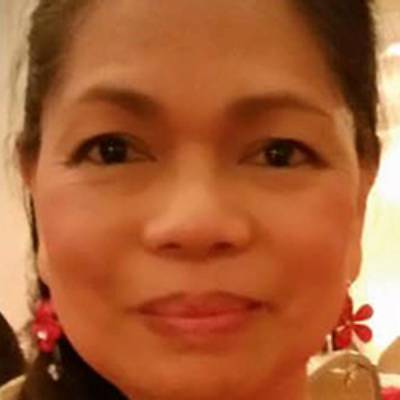
What is your position at Stockton and how did you become interested in the CCDIE?
I am an associate professor of Social Work, primarily assigned to teach in the MSW
Program since 2011. I am also a coordinator of the Victimology and Victim Services
minor, Diversity Faculty Fellow of the Center for Teaching and Learning Design, advisor
of the Pilipino American Students Association of Stockton (PASAS), co-advisor of the
MSW Student Alliance and mentor for the Student Success Scholars.
I have been involved with CCDIE since 2016. My interest in diversity and inclusion
runs deep into my spiritual belief in the oneness of humanity, and acceptance of this
unity means that I should strenuously try to assist in contributing to activities
that support this principle. To put this principle into action, I teach a class on
race, ethnicity, diversity and social justice as a faculty member. As a Diversity
Fellow with Stockton’s Center for Teaching and Learning Design, I serve as a resource
on diversity in teaching and learning. Currently, I am exploring initial strategies
in putting some principles on decolonization in higher education as the next step
to diversity and inclusion. These efforts are consistent with the social work professional
principle of challenging social injustice “by promoting sensitivity to and knowledge
about oppression and cultural and ethnic diversity” (National Association of Social
Workers Code of Ethics). I am also a resource speaker on diversity issues in and outside
the Stockton community.
What do you see as your main contribution(s) to the CCDIE’s work over the years?
To align the goals on diversity and inclusion at Stockton University, CCDIE is a volunteer-driven
entity that provides a structure to organize initiatives that promote the mission “to develop engaged and effective citizens with a commitment to lifelong learning
and the capacity to adapt to change in a multi-cultural, interdependent world.”
I have been involved as a member and later as a co-convener of the Social Justice
and Education Sub-committee for the past four years before I became a co-convener
of CCDIE in 2019. I was proud to assist in organizing the Stockton University Unity Day program in 2019. Planning took almost a year. But the results were impactful and affirming
to the CCDIE mission. Just launching a program like this with direct intent on unity
shows that we are serious about building a culture of respect and care in the University.
Following the theme of unity, the Social Justice and Education Sub-committee hosted
a Zoom pre-conference on Unity of Religion and Spirituality. Perhaps, this is one of those avoidable topics in America, but there is no better
time and place to open the conversation on the topic where about 90% of Americans
believe in some kind of higher power( Pew Research Center, 2017).
I am also involved in organizing the International Faculty and Staff Network. After
a successful “meet and greet,” a group is organized to make it an official affinity
group at Stockton.
What words of wisdom would you share with other members of the campus community who want to get involved in diversity, equity, inclusion, and social justice at Stockton?
One can be involved directly by contacting the Office for Diversity and Inclusion.
We are always looking for volunteers dedicated to the principle of diversity and inclusion.
One may also become involved indirectly by attending activities that promote personal
and professional development around these topics.
As you continue your participation in the CCDIE, what do you hope the CCDIE will explore
over the next couple of years?
In March, we will launch Stockton's second Unity Day 2022, following the same topic
of the pre-conference in April 2021. We hope to generate more participation from the
Stockton community.
I believe that education is always the best tool to avoid colliding with the “isms,”
prejudices, and macro and microaggressions. Education dismantles the destructive paradigms
of ignorance and complacency and complicity and transforms communities toward a better
understanding of diversity and inclusion. I hope to continue to be a part of this
transformation process as a volunteer educator of CCDIE.
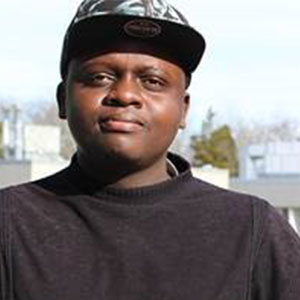
You are the first international student to serve on the Committee for Campus Diversity
and Inclusive Excellence (CCDIE). What inspired you to consider and accept the nomination
to be an appointed member of the CCDIE?
First and foremost, it was an honor to be offered the position by Dr. (JY) Zhou. As
an international student, I have always strived to work with organizations that deal
with inclusion and equity because of my background in creating projects geared toward
social justice. Such as my Board of Trustees fellowship award, where I came up with
a project that would address police brutality against unarmed civilians.
Please share some information about your country and why you selected Stockton for
your college education.
I am an international student from Kenya, which is a beautiful country. We speak Swahili
and English but also have 42 different languages spoken by different tribes. But we
all understand each other through the two languages. I grew up in Nairobi and went
to college in a town called Eldoret, where I did my Bachelor of Arts in Linguistics,
Media and Communication. I wanted to change my major and pursue my dream of being
a software engineer. Thus, the United States looked like a perfect environment to
study computer science because of the higher advanced field of tech and research.
I chose Stockton because I really liked the size of the school and the faculty-to-student
ratio of 17:1, which to me meant that I would be able to interact more with the professors,
as compared to my previous school where classes had a higher population.
In collaboration with other members of the CCDIE, what do you hope to accomplish as
a committee member?
As a committee member, I would like to strive to create more opportunities for students
of color and from low-income households by advocating for opportunities such as scholarships,
so that they may be able to stay in school and have the chance to get their dream
careers.
What do you hope the CCDIE will explore over the next couple of years?
I hope the CCDIE will explore more initiatives to support diversity, especially for
students pursuing tech and STEM majors, because the field is highly underrepresented
by students of color.
What advice would you share with students in our campus community who want to get
involved in diversity, equity, inclusion and social justice at Stockton?
I would like to advise them to participate in different programs that are offered
by different clubs and societies, where they will be able to immerse themselves and
experience different cultures, get to have a taste of their cuisine and make more
connections with students from different ethnic and religious backgrounds. Osprey
Hub is an excellent platform for staying up to date with the latest events and programs.
Is there anything else that you believe is important for our readership to know?
I would like to encourage everyone to take advantage of the opportunities Stockton
has to offer such as the Board of Trustees Fellowship, which is an excellent opportunity
to delve deep into research and share your ideas/work with the community. It’s a good
resume builder and a platform for building a network that may come in handy when looking
for a job.
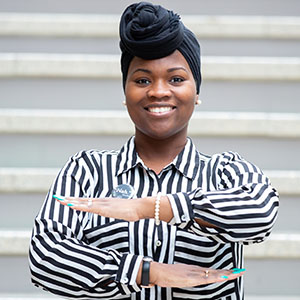
What is your position at Stockton and how did you become interested in the CCDIE?
It is my pleasure to serve as Assistant Director for the Office of Student Development.
In this position, I am given the opportunity to cultivate student leaders, support
a vibrant campus environment through engagement, and facilitate inclusion through
education and programming. After attending an Association of American Colleges and
Universities Institute on Truth, Racial Healing & Transformation (TRHT) Campus Centers
in 2019, I learned about CCDIE. The work of TRHT was very complimentary of the existing
efforts of CCDIE. I was honored and excited to continue my service of diversity, equity,
inclusion and social justice to the University through this committee.
What do you see as your main contribution(s) to the CCDIE’s work over the years?
Life experience is invaluable. My main contribution in any space is showing up authentically,
offering my life experiences, scholarship and perspective. Additionally, my commitment
to facilitating belonging, inclusion and equity has guided me to serve in various
capacities at Stockton. Since my position is a student-facing role, it allows me to
have my finger on the pulse of the students’ needs and desires. Through my work with
CCDIE, we have been able to amplify students' voices and support their inclusion and
success at Stockton.
What advice would you share with other members of the campus community who want to
get involved in diversity, equity, inclusion and social justice at Stockton?
I firmly believe efforts to support diversity, equity, inclusion and social justice
are everyone’s responsibility. Regardless of your service area, there is an opportunity
to create a more inclusive Stockton. I encourage everyone to take inventory of the
common policies, practices, curriculum and functions of their area. In reflection,
consider whose voice is missing, who is unintentionally barred access, and how can
things be changed to improve the quality of experiences for other campus community
members. As agents of change, we should use every opportunity to light up the corners
of the room, especially those with privilege. Beyond self-work, there are amazing
opportunities through initiatives such as SPACES, the Green Dot Bystander Intervention Program and La Mesa: The Residential Oasis for Intercultural Engagement to support an inclusive
and diverse campus community.
What do you hope the CCDIE will explore over the next couple of years?
I look forward to the summits and educational opportunities hosted by CCDIE. Education
is a conduit to great change. My hope is that as University members become better
informed and educated on issues of diversity, equity, inclusion and social justice,
the greater Stockton University will become. Knowledge is power. I am also excited
to see how CCDIE will work in partnership with the Multicultural Center opening this
spring.
Is there anything else that you believe is important for our readership to know?
His Holiness Dali Lama once said, “It is not enough to be compassionate. You must
act.” I encourage everyone to learn more about some of the awesome initiatives hosted
in Student Affairs to support our students and get involved, including:
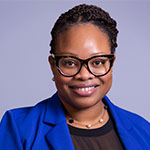
What is your position at Stockton and how did you become interested in the CCDIE?
I am an Assistant Professor of Atlantic History with a specialization in the experiences
of Africans and Afro-descendants in the Atlantic region. I also am affiliated with
faculty in Africana Studies, Latin American and Caribbean Studies, and most recently,
Migration Studies.
Diversity, inclusion and equity initiatives have always been on my radar. As an Afro-Caribbean
woman and given the nature of histories that I study and teach, I came to believe
very early in my career that this is an area where, (1) lessons from the past can
lend well to positive institutional change, and (2) I could gain greater exposure
on how to bridge conversations in the classroom with the larger community.
What do you see as your main contribution(s) to the CCDIE’s work over the years?
When I first joined the CCDIE three years ago, I was not sure what to expect or how
I’d fit in. I just knew the committee’s work fit well with my personal and professional
philosophies. Since then, I’ve found a great niche as the convener for the Branding
and Communication subcommittee. I’ve also made contributions to other subcommittees
and endeavor to represent faculty perspectives in the planning and execution of the
CCDIE goals.
What words of wisdom would you share with other members of the campus community who
want to get involved in diversity, equity, inclusion and social justice at Stockton?
You know, one of the things I appreciate about the CCDIE is its flexibility. It is
a no-pressure environment where members get lots of room to determine where and how
they serve. In these unprecedented times when there is so much more to balancing personal
and work life well, I know many of us would like to get involved but might be concerned
about what this sort of commitment means for everything else that’s going on in life.
I’d say consider ways to support any one of the many CCDIE initiatives. For instance,
the Branding and Communication subcommittee needs people who can help with our newsletter
as editors and other subcommittees have programs that could fit well with your interests
and expertise. If you want to join the subcommittee, you can be as involved as you
want.
As you continue your participation in the CCDIE, what do you hope the CCDIE will explore
over the next couple of years?
We launched the CCDIE newsletter earlier this semester and are already in our third
issue. While we initially imagined the digest as a platform to keep the campus community
informed on any and everything related to the CCDIE’s work, it is quickly becoming
a great repository of sorts. My vision is for the subcommittee to continue to build
the newsletter out as an archive that the entire community can turn to for information
related to diversity, inclusion and equity. I can easily see this becoming another
resource for faculty who are looking to integrate ongoing conversations about race,
social justice and equity into class assignments and/or discussions.
Is there anything else that you believe is important for our readership to know?
First, thank you for the honor of serving our community through the CCDIE. I’d also
like to encourage our readership to see the CCDIE newsletter as an opportunity to
weigh in on various issues and developments related to the committee’s work. There
is a space for everyone’s voice – faculty, staff, students, alumni, you name it. We
welcome your contributions.
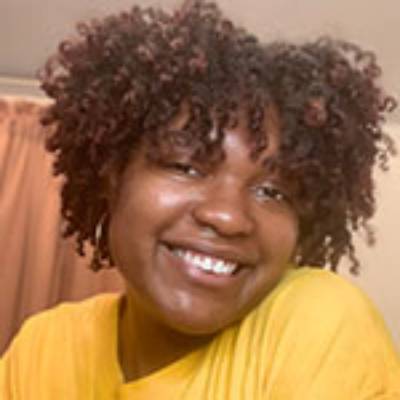
How did you become interested in the CCDIE?
I became interested in CCDIE when I saw racism boldly displayed among the Stockton
community. This particularly took place on social media. Racist posts were made by
members of the Stockton community. However, it was the post made by fellow students
of color describing their experiences on campus, how they weren't surprised by the
little action taken by Stockton's administration, and how they wanted real change
that inspired me most. Personally, the anger and disgust I felt as a student made
me want to do more to really contribute to changing the environment at Stockton.
What do you see as your main contribution to the CCDIE’s work this year?
My main contribution has been helping in planning campus events. Everyone who goes
to Stockton knows one fun thing to do is go to events. This is the best and easiest
way to make friends in Stockton. So, in my time with the Campus Committee on Diversity
and Inclusive Excellence, I’m contributing to creating an atmosphere for people of
different backgrounds to be in one room and connect.
What advice would you share with other members of the campus community who want to
get involved in diversity, equity, inclusion and social justice at Stockton?
My advice would be to start within your community. Most people think you’ve gotta
join a big social justice organization or you're not really doing anything to make
a change. That’s false. Start with your friends. Have the uncomfortable conversation
about race and racism with your roommate or the people on your floor. Sit down and
talk with your family about it. This changes the mindsets of those around you so that
they can go out and have that conversation with other people they encounter.
What do you hope the CCDIE will explore over the next couple of years?
I hope the CCDIE will explore the environmental needs of students of color and how
to address them. By that I mean, what do students of color need for campus to feel
like home? It may be more people who look like them in the counseling center or as
their professors.
Is there anything else that you believe is important for our readership to know?
Remember it starts with you.
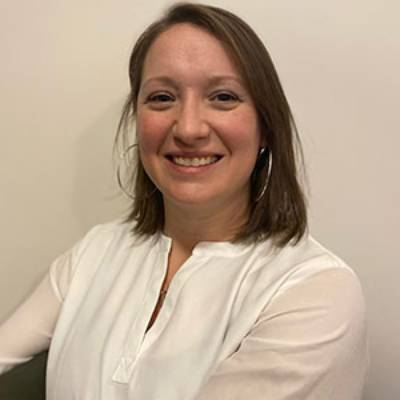
How did you become interested in the CCDIE?
Many, many years ago I was asked by my departmental director to serve as a representative
on what was then called the College Committee for Diversity, Equity and Affirmative
Action or simply the Diversity Committee. I’ve been a member ever since.
What do you see as your main contribution(s) to the CCDIE’s work over the years?
The maintenance and operations staff are unique in many ways in comparison to other
departments and divisions throughout the rest of the campus, and I hope I’ve been
able to offer a different perspective, not only in conversations within the CCDIE
but also held with my departmental coworkers.
What advice would you share with other members of the campus community who want to
get involved in diversity, equity, inclusion and social justice at Stockton?
Just take the step and sign up for the Zoom symposium, seminar, or training opportunity
that’s available. During my early years as a staff member, I signed up to participate
in a three-day program on campus called NCBI – National Coalition Building Institute
and, not only was it a valuable learning experience, it gave me the confidence to
speak on things I know, ask about things I don’t and try to be an ally to my fellow
humans.
What do you hope the CCDIE will explore over the next couple of years?
I would love to find a way for more individuals, staff in particular, to become involved.
I’m not presumptuous enough to begin to know how or what that looks like, but I think
that there are individuals who may want to get involved and don’t know how or where
to begin.
Is there anything else that you believe is important for our readership to know?
I am honored to be interviewed for the inaugural newsletter. There are so many wonderful
members of our Stockton community making such strides in the world for social justice
awareness and education. I am humbled to be able to listen to them, learn from them
and engage with them to broaden my perspective.
